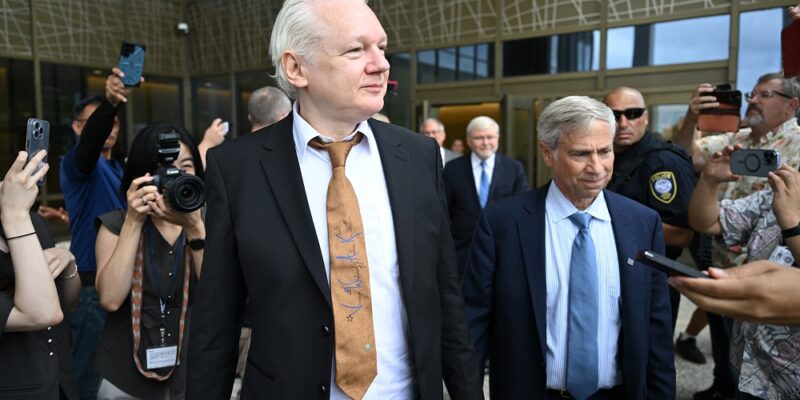Assange is free, but the US has not given up on intimidating journalists

The European Federation of Journalists (EFJ) joins the International Federation of Journalists (IFJ) in welcoming the release of Australian journalist Julian Assange, after 14 years of judicial harassment and five years in prison. The dropping of 17 of the 18 charges that he faced avoids the criminalisation of the normal journalistic practices of encouraging sources to confidentially share evidence of wrongdoing and criminality. But by forcing Julian Assange to plead guilty to a crime he didn’t commit, the US is keeping up the pressure on any journalist, anywhere in the world, who reveals classified information on US national defense.
Julian Assange walked free and was on his way back to Australia today after a plea deal with the United States ended years of legal drama for the WikiLeaks founder. Assange, who from 2010 published hundreds of thousands of confidential US documents on the whistleblowing website, was released this week from a high-security British prison.
Julian Assange traveled to the Northern Mariana Islands, a Pacific US territory, to plead guilty to a single count of conspiracy to obtain and disseminate national defense information. He was sentenced today to five years and two months in prison, but credited for the same amount of time he spent behind bars in Britain while fighting extradition to the United States.
“You will be able to walk out of this courtroom a free man,” the judge told Assange, adding she hoped the deal would restore some “peace” to him after his incarceration.
US authorities had wanted to put Assange on trial for divulging military secrets about US war crimes in Iraq and Afghanistan. Washington had accused Assange under the 1917 Espionage Act. He was indicted by a US federal grand jury in 2019 on 18 counts stemming from WikiLeaks’ publication of a trove of national security documents. The material included video showing civilians being killed by fire from a US helicopter gunship in Iraq in 2007. The victims included a photographer and a driver from Reuters.
Assange was held in London’s Belmarsh prison from 2019 after spending seven years in Ecuador’s embassy in the UK capital to avoid extradition to Sweden, where he faced accusations of sexual assault that were eventually dropped.
The plea deal announcement came two weeks before Assange was scheduled to appear in court in Britain to appeal against a ruling that approved his extradition to the United States.
The IFJ has campaigned for the release of Assange since the publication of US charges against him in 2019. Last year, 20 journalists’ unions and associations affiliated to the EFJ granted Julian Assange membership (or honorary membership) of their organisations. An IFJ observer has attended every day of his extradition hearings, providing reporting and commentary on proceedings. And on 18 June the IFJ’s executive Committee and several members of the EFJ Steering Committee mounted a protest outside HMP Belmarsh in the UK where Assange was held – probably the last ever prison-gate protest for the Wikileaks founder.
“We should really welcome the release of Julian Assange, who should never have been subjected to such judicial harassment, just for telling the truth about US war crimes,” said Maja Sever, EFJ President. “But as the UN Special Rapporteur on Freedom of Opinion and Expression Irene Khan explained, by refusing to drop the Espionage Act charges and forcing Assange to plead guilty to a crime of conspiracy that he did not commit, the US is keeping up the pressure on all journalists who would use information relating to US national defense. Assange is free, but the US has not given up on intimidating journalists”.






